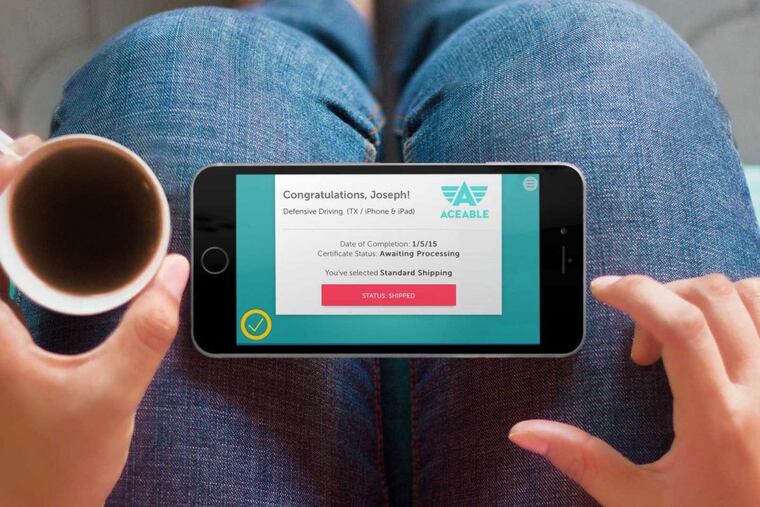With Aceable, Pa. drivers education is now in the palm of your hand
A new smartphone course aims to steer young drivers down the straight and narrow.

Smartphones have gotten a bad rap, called a major hazard to our collective health, especially when those distracting devices are in the hands of clueless, inexperienced drivers.
But this week, that reputation may be due for rehabilitation as the mobile education platform Aceable officially lands in Pennsylvania, pitching the smartphone as a tool for better driving habits.
Aceable (as in "now you'll ace that test") is the first state-approved drivers education course that students can take on a mobile phone (or tablet) – "while you're on the school bus or in the lunchroom cafeteria, with time to kill," said company CEO Blake Garrett. "We make the material fun, memorable, and convenient. Really, this is the wave of the future for education. Mobile learning is becoming ubiquitous."
Hosted by a cartoon and a wisecracking "robot instructor," with video clips (some in 360-degree virtual reality) and lots of user interaction, the Aceable driving course is designed to be easily ingested and digested in "five screen increments," with a refresher quiz at the end of each section. Ideal for the short-attention-span set.
Yet, when all 19 segments are read, heard, and tested with a final, the program equals the 30-hour, in-class course developed almost 20 years ago by Pennsylvania's transportation and education departments as part of the state's "graduated licensing" program for new drivers.
While it's the first provider in-state with a "mobile" course variant, Aceable is actually one of "10 companies approved to provide online driver education theory in Pennsylvania," said Casey Smith, acting communications director of the Department of Education. These online courses can't be taken alone, he noted. They must be given in tandem with "either local education agencies or a private driver training school." The school verifies your certificate of successful completion and pushes the paperwork through to Harrisburg, Garrett said.
For those who first scored a license when gas was less than $1 a gallon, the graduated license is a fine tuning of the junior driver program that used to turn youthful drivers' cars into pumpkins at the witching hour on weekends (even earlier on weeknights).
Today, a junior (16-18-year-old) driver can't even get behind the wheel without being accompanied by an adult driver for the first six months and 65 hours of trainer-wheels driving "in varied weather conditions and different times of day — up to 11 p.m.," said Mark Moser, director of the Blue Bell Driving School. "No class study is mandatory, that's supplemental. But it comes with perks and is seen as a rite of passage and personal pride for a lot of young people."
With the added 30 hours of classroom or online/mobile education completed, a driver can score an unrestricted license six months sooner — at 17½. "So you can drive to concerts and the prom, not stress when events run late, have more passengers in the vehicle, and maybe get a discount on your car insurance," said Moser.
Even more likely to win an insurance discount, he said, is a combo of 30 hours drivers ed plus six hours of behind-the-wheel training with a professional instructor — a bundle that costs $500 to $550 at his Plymouth Meeting school. If you're lucky enough to go to a high school that offers a complimentary drivers-ed course, the Aceable online education alone costs $80.
Blue Bell is the first local driving academy to align with Aceable. Moser called the course "pretty engaging and more interactive than the online courses we've worked with. It's paced well for people to work through in small, convenient segments and will be great for us as a business. We needed an alternative to the classroom if we wanted to stay competitive with our fellow driving schools. This will enable us to offer something newer, more exciting and state of the art."
Launched first in Texas three years ago, and now available in six other states, Aceable's "eLearning" enterprise has been a hard sell in some locations — New York and Massachusetts don't permit any online drivers ed courses — and it faces a shrinking pool of would-be drivers anyplace where there's Uber.
The methodology is not without critics, such as Allen Robinson, chief executive of the American Driver and Traffic Safety Education Association, who opines that online drivers ed is better than nothing for distant learners, but face-to-face student-teacher interaction is best.
Garrett responds that with "adaptive learning technology," eLearning can be extra-fine tuned for each participant.
Aceable has won backing of at least $8.7 million in seed and series A funding from venture capital firms such as Silverton Partners and FloodGate to expand nationally. Garrett contemplates his mobile education strategy moving into other certificate career-based studies, ranging from nursing to cosmetology.
Statista.com has forecast that the global mobile education market volume will grow from $12.4 billion in 2016 to $37.8 billion in 2020.